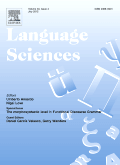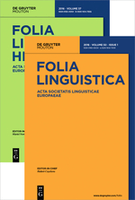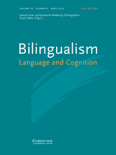
LANGUAGE SCIENCES
Scope & Guideline
Advancing Knowledge in Language and Cognition
Introduction
Aims and Scopes
- Interdisciplinary Language Studies:
The journal emphasizes research that integrates insights from various disciplines, including linguistics, cognitive science, sociology, and psychology, to provide a holistic understanding of language. - Cultural and Social Contexts of Language:
A significant focus is placed on how language functions within different cultural and social contexts, exploring interactions, identity construction, and the implications of language use in societal settings. - Cognitive Linguistics and Language Processing:
The journal covers studies that investigate the cognitive underpinnings of language processing, including how language is acquired, produced, and understood in real-time communication. - Language and Power Dynamics:
Research addressing how language influences and is influenced by power dynamics within societies, including discourse analysis and the role of language in shaping ideologies and social relations. - Ecological and Environmental Linguistics:
A unique contribution of the journal is its exploration of language in relation to ecological and environmental issues, examining how language shapes and reflects environmental awareness and practices.
Trending and Emerging
- Multimodal Communication:
There is a growing interest in research that examines how language interacts with other modalities, such as visual and gestural communication, reflecting the complexities of real-world interactions. - Language and Identity:
Emerging themes explore the intricate relationship between language and identity, including how language practices contribute to identity formation in diverse sociocultural contexts. - Ecological Linguistics:
Research focusing on the intersection of language and environmental issues is on the rise, highlighting the role of language in shaping ecological awareness and discourse surrounding climate change. - Dialogism and Interaction Analysis:
Papers employing dialogical and interactional frameworks to analyze communication processes are becoming more prevalent, emphasizing the importance of context and co-construction in language use. - Language Policy and Minority Languages:
There is an increasing focus on language policy, particularly concerning minority languages and their role in identity and cultural preservation, reflecting broader societal discussions around inclusivity and representation.
Declining or Waning
- Traditional Psycholinguistics:
Research explicitly focused on traditional psycholinguistic methods has seen a decline, possibly due to the journal's increasingly interdisciplinary approach that encompasses broader cognitive and social perspectives. - Formal Linguistic Theory:
Papers that heavily rely on formal linguistic frameworks, such as generative grammar, appear to be less frequent, indicating a shift towards more applied and interaction-focused studies. - Narrowly Defined Linguistic Structures:
There is a noticeable reduction in studies that focus solely on narrowly defined linguistic structures without considering their practical or sociocultural implications, suggesting a move towards more contextually rich analyses.
Similar Journals

MUTTERSPRACHE
Fostering Insightful Discussions in Linguistic ResearchMUTTERSPRACHE is a prominent journal published by GESELLSCHAFT DEUTSCHE SPRACHE, focusing on the fields of linguistics and language studies. Based in Wiesbaden, Germany, this esteemed publication brings together a diverse spectrum of research articles, reviews, and discussions that delve into both the theoretical and practical aspects of language use. With the ISSN 0027-514X and notable inclusion in Scopus rankings, it stands at Q3 in Linguistics and Language for 2023, reflecting its relevance in academia. Though not an Open Access journal, *MutterSprache* offers a valuable repository of knowledge for researchers, professionals, and students interested in the nuances of German language and broader linguistic phenomena. The journal has been converging its scope from 2002 to 2024, ensuring a comprehensive exploration of evolving language trends and linguistic research methodologies.

BRAIN AND LANGUAGE
Bridging Insights in Psychology, Speech, and LanguageBRAIN AND LANGUAGE is a premier journal published by Academic Press Inc Elsevier Science, dedicated to fostering scholarly communication in the fields of Cognitive Neuroscience, Linguistics, Psychology, and Speech and Hearing. With its ISSN 0093-934X (Print) and 1090-2155 (Online), the journal has established a significant presence since its inception in 1974, continuing to provide valuable insights into the intricate relationship between brain function and language processing. This journal is highly regarded, boasting a 2023 ranking of Q1 in Linguistics and Language, reflecting its influential contributions to the field, alongside Q2 rankings in categories such as Cognitive Neuroscience and Experimental Psychology. With a rigorous peer-review process, it serves as an essential resource for researchers and professionals seeking to deepen their understanding of language mechanisms and their cognitive underpinnings. Despite not being an Open Access journal, BRAIN AND LANGUAGE ensures that its articles are widely accessible and of high quality, making it an indispensable platform for both emerging and established scholars aiming to expand the boundaries of research in language and cognition.

Lingue e Linguaggio
Fostering Insights in Linguistics and Language StudiesLingue e Linguaggio, published by SOC ED IL MULINO, is a distinguished academic journal in the field of Linguistics and Language, hailing from Bologna, Italy. With an esteemed Q2 ranking in its category as of 2023, this journal is recognized for its contributions to both the arts and humanities as well as social sciences, achieving notable positions within Scopus rankings. It serves as a vital platform for researchers, practitioners, and students interested in exploring various linguistic phenomena, language dynamics, and theoretical frameworks. Although it operates under a traditional subscription model rather than open access, its comprehensive array of studies and publications provides significant insights and fosters academic discourse. With a publication period extending from 2002 to 2024, Lingue e Linguaggio continues to be a key resource for advancing the understanding of language in contemporary contexts.

CogniTextes
Diving Deep into the Cognitive Fabric of Text.CogniTextes (ISSN: 1958-5322) is an esteemed open access journal published by the Association Française de Linguistique Cognitive, dedicated to the exploration of cognitive linguistics and its intersection with textual interpretation. Since its inception in 2007, CogniTextes has been a vital platform for disseminating cutting-edge research that delves into the cognitive processes underlying language use, enhancing our understanding of linguistics in a cognitive context. This journal not only fosters scholarly communication among researchers and professionals but also serves as a valuable resource for students keen on advancing their knowledge in cognitive linguistics. With its headquarters located at the University of Lille 3 in France, CogniTextes encourages contributions from a diverse spectrum of disciplines, thereby enriching the field of linguistics and cognitive studies. The journal's commitment to open access ensures that its findings are readily available to a global audience, thus facilitating knowledge sharing and academic discourse.

RUSSIAN LINGUISTICS
Catalyzing collaboration in the global linguistic community.RUSSIAN LINGUISTICS is a peer-reviewed academic journal published by Springer, dedicated to advancing the understanding of the Russian language and its interplay with various linguistic frameworks. With a longstanding history that spans from its inception in 1974, the journal encompasses a broad range of topics within the fields of linguistics and language studies, offering valuable insights especially in *Developmental and Educational Psychology* and the intricacies of linguistics at large. Currently ranked in the Q2 quartile for Linguistics and Language, and holding substantial positions within Scopus rankings, RUSSIAN LINGUISTICS serves as an essential resource for researchers, educators, and students alike, fostering dialogue and collaboration within the international linguistic community. The journal notably provides critical access to research findings that enhance the comprehension of Russian linguistics' role in a global context, despite operating under a traditional access model. For those pursuing scholarly excellence, RUSSIAN LINGUISTICS remains a pivotal platform for disseminating innovative research and promoting the study of language.

FOLIA LINGUISTICA
Pioneering Research at the Forefront of LinguisticsFOLIA LINGUISTICA, published by WALTER DE GRUYTER GMBH, is a premier scholarly journal dedicated to the field of linguistics. Established in 1967, the journal has consistently provided a platform for innovative research and scholarly discourse in language and linguistics, contributing significantly to the academic community's understanding of language structures, usage, and cognitive processes. With its classification in the top quartile (Q1) of linguistics and language in 2023, FOLIA LINGUISTICA holds a respectable rank (#282/1088) within the Arts and Humanities category and an admirable percentile rank of 74th, ensuring its position at the forefront of linguistic scholarship. Researchers and academics from around the globe can access a wealth of knowledge and cutting-edge research findings through this esteemed publication, which is vital for anyone looking to engage with the latest advancements in linguistics. Located in Berlin, Germany, FOLIA LINGUISTICA encompasses all aspects of language research, making it an indispensable resource for researchers, professionals, and students alike seeking to deepen their understanding of language and its complexities.

Russian Journal of Linguistics
Championing High-Quality Research in Language DynamicsWelcome to the Russian Journal of Linguistics, a prestigious journal published by Peoples Friendship University of Russia that has made significant strides in the realm of linguistic studies since its inception. With an Open Access policy established in 2019, this journal provides unparalleled opportunities for researchers, professionals, and students to share and disseminate groundbreaking linguistic research. The journal is currently ranked in the Q1 category for Linguistics and Language and boasts impressive Scopus rankings, placing 129th out of 1088 in the Arts and Humanities, and 148th out of 1167 in the Social Sciences. Focusing on a diverse range of linguistics topics, the journal aims to facilitate cross-disciplinary dialogue and foster advancements in the study of language. Located in Moscow, Russia, it champions the vibrant linguistic community by consistently publishing high-quality research that contributes to the global understanding of language dynamics. We invite you to explore the wealth of knowledge and insight the Russian Journal of Linguistics has to offer.

Cognitive Studies-Etudes Cognitives
Innovating Insights in Cognitive StudiesCognitive Studies-Etudes Cognitives, published by the Polish Academy of Sciences, Institute of Slavic Studies, is a prominent open-access journal based in Poland, dedicated to advancing research in the interdisciplinary fields of cognitive studies, communication, and linguistics. Since its inception, the journal has made a significant impact in the academic community, evidenced by its ranking in the Scopus database within the top 30% for Language and Linguistics. With an aim to bridge theoretical insights and practical applications, Cognitive Studies invites contributions that explore the complex interplay between language, cognition, and technology, making it a vital resource for researchers, professionals, and students alike. As the journal continues to grow, it remains committed to maintaining rigorous standards for publication while fostering an inclusive environment for innovative ideas and diverse perspectives. The journal is easily accessible and aims to facilitate knowledge dissemination, proudly offering open access since 2014.

Bilingualism-Language and Cognition
Illuminating the Cognitive Benefits of BilingualismBilingualism-Language and Cognition, published by Cambridge University Press, is a leading journal in the fields of Education and Linguistics, renowned for its rigorous academic contributions and influential research. With an impressive impact factor placing it in the Q1 quartile of both fields, this journal ranks among the top-tier publications globally, reflecting its commitment to advancing the understanding of bilingualism and its cognitive implications. Since its inception in 2005, Bilingualism-Language and Cognition has garnered significant attention, evidenced by its remarkable Scopus rankings—11th in Language and Linguistics and 12th in Social Sciences. Dedicated to publishing high-quality original research, reviews, and integrative studies, the journal aims to foster interdisciplinary dialogue among researchers, educators, and practitioners. Although not currently an open access journal, it remains a vital resource for those engaged in bilingualism research and its cognitive dimensions, contributing to the academic landscape from its home in Cambridge, United Kingdom.

Functions of Language
Illuminating the Dynamics of Language FunctionsFunctions of Language, published by John Benjamins Publishing Co, serves as a vital platform for scholars and practitioners in the fields of linguistics and language studies. With its ISSN 0929-998X and E-ISSN 1569-9765, this esteemed journal, based in the Netherlands, has solidified its reputation through a focused dedication to exploring the multifaceted roles that language plays across various contexts. Ranked in the top percentile of leading journals in Linguistics and Language (Q2 category, 2023) and holding impressive Scopus ranks within both the Arts and Humanities and Social Sciences sectors, the journal emphasizes research that interlinks theoretical insights with practical implications. Functions of Language aims to advance our understanding of linguistic structures and their applications, making it an essential resource for researchers, professionals, and students alike who are eager to contribute to the evolving discourse in language studies. With content converging from 1994 to 2024, the journal reflects ongoing scholarly engagement and innovation in the field.